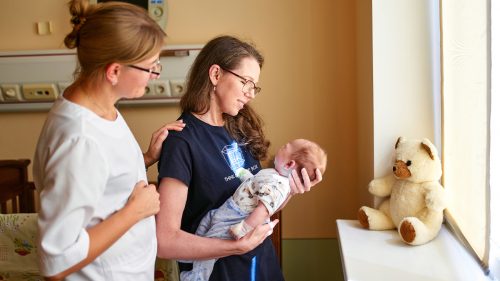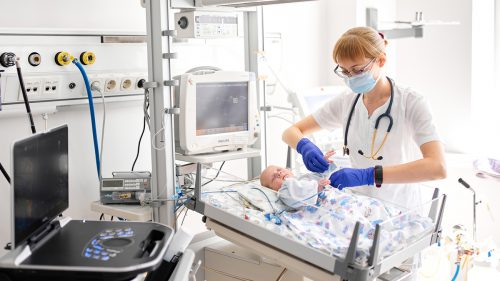Adult consulting:
Mon, Fri: 8:30-15:30
Tue, Wed, Thu: 08:00 - 19:00
Sat: 09:00-15:30
+380 68 096-97-90
Children consulting
Hospitalization
of children
5 A, Bratyslavska str,
Kyiv 02166, Ukraine

The paediatric cardiac surgery department performs a full range of surgeries for congenital heart disease. We do our best to make each of our little patients leave the hospital healthy and happy. We treat patients of all ages, including newborns and preterm babies.
Department is designed for 20 beds, located in single and double rooms, equipped for the most comfortable stay of children and their parents. About 500 surgeries are performed in the department per year.
The work of the cardiac surgery department of congenital heart defects is organized in accordance with the standards of world’s best clinics. Thanks to the correct organization of the workflow of qualified personnel and the availability of modern equipment, we have achieved high results in such a complex area of surgery.
Paediatric Day Hospital has 20 stationary beds, which are located in single and double rooms. The rooms are equipped with oxygen systems and monitors. The nurse’s post is equipped with a round-the-clock monitoring station, which allows to constantly monitor the main parameters of the patient (blood pressure, cardiogram, heart rate, etc.).
The post also has a “nurse terminal” that allows you to communicate with each patient. Each room is equipped with emergency call buttons, which are conveniently located so that the patient can sound the alarm from anywhere in the room.
The game hall, which is in front of the medical staff, is never empty. Here children receive positive emotions and are distracted from medical manipulations and white coats. All this promotes the fastest recovery of young patients.
An individual approach to each patient is the main principle of our department. Twice a week, clinical cases are analyzed with the involvement of not only leading specialists of the Heart Institute, but also consultants of other specialties in order to determine treatment tactics for each patient. Alongside with doctors, there are experienced and responsive nurses, diligent junior medical personnel who provide cleanliness and comfort in the department.
For hospitalization in the Department of Surgical Treatment of Congenital Heart Diseases of Children you need to have:
Recommendations for child care after surgery
After heart surgery, most children can be discharged from the hospital. Further rehabilitation after surgical patients takes place with the direct participation of parents and close relatives under the supervision of a cardiologist or paediatrician.


